当生活给你柠檬时,挤过去:了解印度自由放养的狗对柑橘的回避行为
IF 2
2区 农林科学
Q1 AGRICULTURE, DAIRY & ANIMAL SCIENCE
引用次数: 0
摘要
食物的适口性受到多种因素的影响,如味道、气味、质地和新鲜度,这些因素在不同物种之间差异很大。这些因素,加上当地的环境条件,往往塑造了不同人群的饮食习惯。特别是,食物供应可以推动当地适应,不仅影响觅食行为,还影响物种的生存策略。城市化改变了食物的自然可得性,既导致生物多样性迅速下降,也导致某些物种在当地发展出适应能力,使它们能够在变化的环境中生存。自由放养的狗(frd)已经与人类共存了几个世纪,为研究当地适应性提供了一个完美的模型系统。在这项研究中,我们试图了解他们在印度的食腐行为的一个具体方面-柑橘厌恶。众所周知,宠物狗不会吃柑橘类水果和受其污染的食物。在印度,柠檬被广泛用于烹饪,并作为厨房垃圾丢弃,这是食腐动物的主要食物来源。我们报告了一组实验,揭示了frd的柑橘回避行为。在我们的选择测试中,狗使用不同的策略来获取鸡肉和避开柠檬。一项调查显示,人们避免给自己的宠物吃柑橘类污染的食物,但对frd却没有同样的注意。本研究表明,印度西孟加拉邦的frd很好地适应了在柑橘污染的垃圾中觅食,并有自己的策略来尽可能避免污染,同时最大限度地提高它们的首选食物摄入量。这些结果有助于更好地了解frd的饮食偏好,并为促进负责任的人与动物互动提供策略。本文章由计算机程序翻译,如有差异,请以英文原文为准。
When life gives you lemons, squeeze your way through: Understanding citrus avoidance behaviour by free-ranging dogs in India
Palatability of food is influenced by multiple factors such as taste, smell, texture, and freshness, which can vary widely across species. These factors, along with local environmental conditions, often shape the food habits of different populations. In particular, food availability can drive local adaptations, influencing not only the foraging behaviour but also the survival strategies of species. Urbanization, which alters the natural availability of food, has contributed to both a rapid decline in biodiversity and, in some species, the development of local adaptations that allow them to survive in modified environments. Free-ranging dogs (FRDs) have co-existed with humans for centuries, and present a perfect model system for studying local adaptations. In this study, we attempted to understand a specific aspect of their scavenging behaviour in India – citrus aversion. Pet dogs are known to avoid citrus fruits and food contaminated by them. In India, lemons are used widely in the cuisine, and discarded as kitchen waste, which is a primary source of food for scavenging FRDs. We report a set of experiments that revealed the citrus avoidance behaviour of FRDs. The dogs used different manoeuvres to procure the chicken and avoid the lemon provided in our choice tests. A survey revealed that people avoid giving citrus contaminated food to their own pets, but do not follow the same caution in case of FRDs. This study revealed that FRDs in West Bengal, India, are well adapted to scavenging among citrus-contaminated garbage, and have their own strategies to avoid the contamination as far as possible, while maximizing their preferred food intake. These results contribute to a better understanding of FRDs' dietary preferences and inform strategies for promoting responsible human-animal interactions.
求助全文
通过发布文献求助,成功后即可免费获取论文全文。
去求助
来源期刊

Applied Animal Behaviour Science
农林科学-行为科学
CiteScore
4.40
自引率
21.70%
发文量
191
审稿时长
18.1 weeks
期刊介绍:
This journal publishes relevant information on the behaviour of domesticated and utilized animals.
Topics covered include:
-Behaviour of farm, zoo and laboratory animals in relation to animal management and welfare
-Behaviour of companion animals in relation to behavioural problems, for example, in relation to the training of dogs for different purposes, in relation to behavioural problems
-Studies of the behaviour of wild animals when these studies are relevant from an applied perspective, for example in relation to wildlife management, pest management or nature conservation
-Methodological studies within relevant fields
The principal subjects are farm, companion and laboratory animals, including, of course, poultry. The journal also deals with the following animal subjects:
-Those involved in any farming system, e.g. deer, rabbits and fur-bearing animals
-Those in ANY form of confinement, e.g. zoos, safari parks and other forms of display
-Feral animals, and any animal species which impinge on farming operations, e.g. as causes of loss or damage
-Species used for hunting, recreation etc. may also be considered as acceptable subjects in some instances
-Laboratory animals, if the material relates to their behavioural requirements
 求助内容:
求助内容: 应助结果提醒方式:
应助结果提醒方式:


